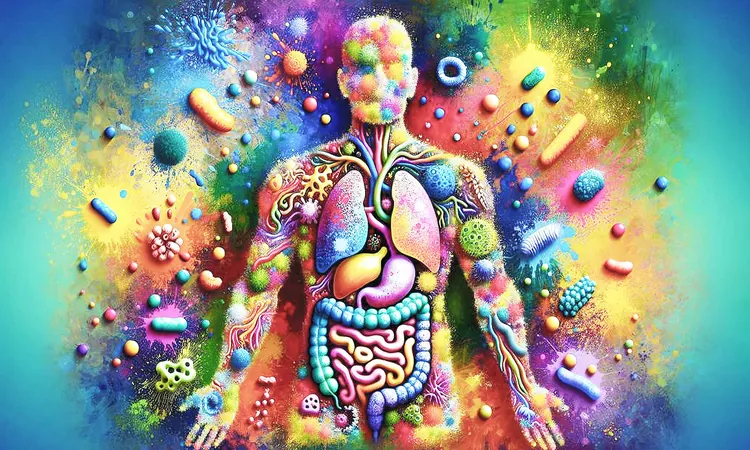
Your Microbiome: The Hidden Fingerprint of Your Health
2025-03-31
Author: Wai
Did you know that your body is home to trillions of bacteria, constituting a unique microbiome that affects every aspect of your health, from digestion to immunity?
Recent research reveals that just like fingerprints, our microbial communities are distinctive to each individual, presenting a wealth of untapped potential for personalized health care.
For over six years, a team of dedicated scientists, led by Michael Snyder from Stanford University, monitored the microbiomes of participants aged 29 to 75. They meticulously collected samples from various sites on the body, including the gut, mouth, nose, and skin, analyzing changes that occurred during short-term illnesses, chronic diseases, and day-to-day living. The collaboration included the late George Weinstock from Jackson Laboratory, reflecting the interdisciplinary nature of this groundbreaking research.
The Trillions Within Us
The human microbiome comprises an astonishing 39 trillion microbes, as confirmed by scientists. "Our results underscore that each of us has individualized microbiomes that are special to us," Snyder elaborated. These distinctive bacterial communities are shaped by multiple factors, including genetics, diet, and the immune system, resulting in vast diversity that directly influences health outcomes.
This remarkable variety among individuals leads to the implication that personalized health care could become the norm. As researchers learn more about these differences, they could unlock new pathways for tailored medical treatments based on individual microbiomic profiles.
Temporary Flux and Stability
During the research, over 5,432 biological samples revealed transformative insights. For instance, genetic sequencing identified changes in microbial populations during times of health and illness, highlighting that certain conditions, like Type 2 diabetes, correlate with less diverse and stable microbiomes. Additionally, temporary disruptions were observed during brief illnesses, such as colds, which caused marked changes in microbial balance.
Snyder noted an unexpected finding: instead of shared bacteria being the most stable, it is indeed the personalized microbiome that exhibits the greatest consistency, unaffected by environmental shifts. This points to a strong baseline stability that each person carries, critical for resilience against health challenges.
Interconnected Microbial Ecosystems
Interestingly, shifts occurring in one part of the body, like the skin or mouth, were found to correlate with changes in gut microbiota, indicating that our body’s microbes function as a cohesive system. Moreover, certain immune proteins in the bloodstream synchronized with these microbial changes, illuminating how closely our immune responses are tied to microbial health.
Environmental factors such as seasonal changes do influence the microbiome, yet they cannot fully account for the significant variations seen among different individuals, underscoring the complexity and individuality of our microbial environment.
The Importance of the Microbiome
Understanding a person’s microbiome composition and stability could provide critical insights into their responses to illnesses or treatments. "How you feed it and what it's exposed to probably makes a big impact on your health," Snyder stated, emphasizing the need for continued investigation. By honing in on personal microbiome features, future research endeavors may tailor medical guidance that aligns directly with individual microbial makeup.
The Evolution of Microbial Awareness
Our fascination with microbes began centuries ago but took a significant turn with the acknowledgment of their beneficial roles in human health. The term "microbiome" emerged in the early 2000s, as researchers began to appreciate that these organisms are vital for our bodily functions, not just harmful intruders.
Today, ongoing studies explore the influence of diet, medication, and aging on microbial diversity, linking it to various aspects of metabolic processes and even mental health.
The Future of Microbiome Research
The future of microbiome research is promising, with opportunities to utilize findings in developing personalized health plans. Potential advancements include designing custom probiotics or therapies and monitoring microbial markers to preempt chronic diseases. The relationship between gut microbes and brain chemistry is another frontier, raising intriguing questions about mental health connections.
As technology advances, we are on the brink of more precise mapping of our unique bacterial populations. This could pave the way toward individualized health strategies that significantly enhance our well-being.
In summary
As fascination with the microbiome grows, it becomes increasingly clear that these myriad bacteria in our bodies are crucial players in shaping our health. With simple lifestyle modifications, we might harness these microbial communities to foster resilience and improve overall health outcomes, emphasizing the importance of personalized medicine in the modern world.
Stay updated on this groundbreaking research published in leading scientific journals and witness how our understanding of the microbiome could transform health care as we know it!


 Brasil (PT)
Brasil (PT)
 Canada (EN)
Canada (EN)
 Chile (ES)
Chile (ES)
 Česko (CS)
Česko (CS)
 대한민국 (KO)
대한민국 (KO)
 España (ES)
España (ES)
 France (FR)
France (FR)
 Hong Kong (EN)
Hong Kong (EN)
 Italia (IT)
Italia (IT)
 日本 (JA)
日本 (JA)
 Magyarország (HU)
Magyarország (HU)
 Norge (NO)
Norge (NO)
 Polska (PL)
Polska (PL)
 Schweiz (DE)
Schweiz (DE)
 Singapore (EN)
Singapore (EN)
 Sverige (SV)
Sverige (SV)
 Suomi (FI)
Suomi (FI)
 Türkiye (TR)
Türkiye (TR)
 الإمارات العربية المتحدة (AR)
الإمارات العربية المتحدة (AR)